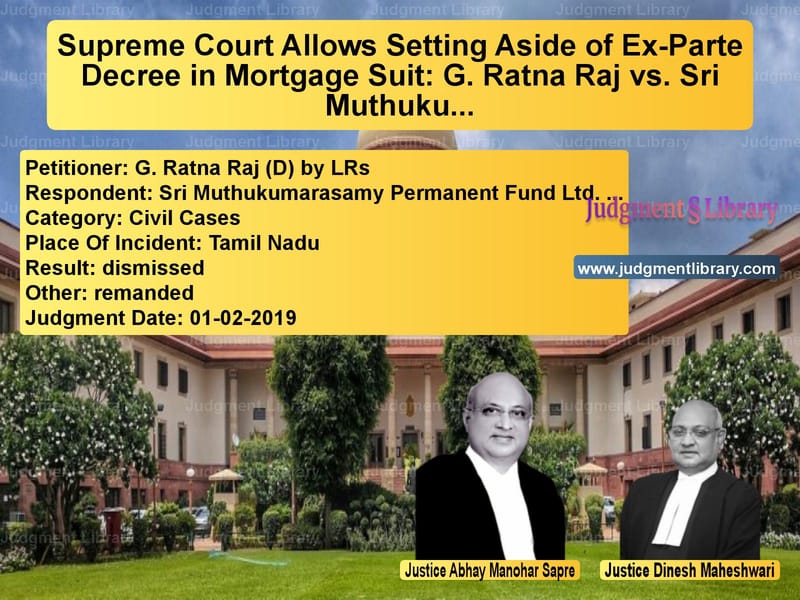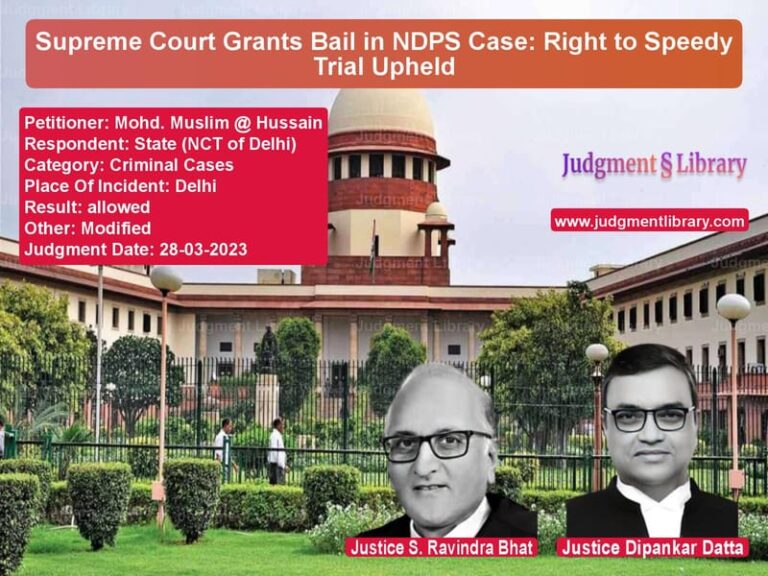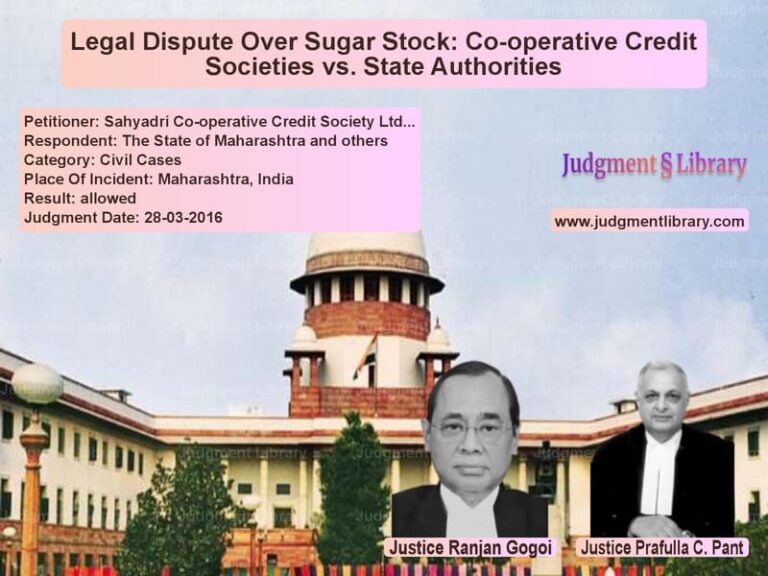Supreme Court Allows Setting Aside of Ex-Parte Decree in Mortgage Suit: G. Ratna Raj vs. Sri Muthukumarasamy Permanent Fund Ltd.
The Supreme Court of India, in the case of G. Ratna Raj vs. Sri Muthukumarasamy Permanent Fund Ltd., addressed a significant issue regarding the setting aside of an ex-parte decree in a mortgage suit. The judgment clarifies the legal position on ex-parte proceedings and provides clarity on when an order under Order 9 Rule 13 of the Civil Procedure Code (CPC) is maintainable.
Background of the Case
The case originated from a civil suit filed by G. Ratna Raj (plaintiff) against Sri Muthukumarasamy Permanent Fund Ltd. (defendant No.1) in the High Court of Madras. The suit, numbered O.S. No. 131/1999, sought:
- Redemption of mortgage related to certain immovable properties.
- A permanent injunction restraining the defendants from interfering with the property.
The defendants were served with summons and filed their written statement. However, at a later stage, they failed to appear in court, and the case proceeded ex-parte. The trial court, by its judgment dated February 25, 2003, passed a preliminary decree in favor of the plaintiff.
Subsequent Developments
Following the decree, the defendants filed two applications before the trial court:
- IA No. 341/2006: An application under Order 9 Rule 13 CPC for setting aside the ex-parte decree.
- IA No. 340/2006: An application seeking condonation of delay in filing the application under Order 9 Rule 13.
The trial court dismissed both applications, holding that the decree was not ex-parte and, therefore, Order 9 Rule 13 CPC was not applicable. The defendants then appealed before the Madras High Court.
High Court’s Decision
The Madras High Court reversed the trial court’s order and held that:
- The preliminary decree passed on February 25, 2003, was indeed an ex-parte decree within the meaning of Order 9 Rule 6 CPC.
- Since the decree was ex-parte, Order 9 Rule 13 CPC was applicable, and the application for setting aside the decree was maintainable.
- The case should be restored for fresh adjudication.
The High Court directed that the suit be reopened and allowed the defendants to contest the case upon payment of a cost of Rs. 10,000 to the plaintiff.
Appeal Before the Supreme Court
Aggrieved by the High Court’s decision, the plaintiff (now represented by his legal representatives) appealed to the Supreme Court. The key legal issue before the Supreme Court was:
- Whether the High Court was correct in treating the preliminary decree as an ex-parte decree and allowing its setting aside under Order 9 Rule 13 CPC.
Arguments of the Parties
Appellant’s Arguments
The plaintiff’s legal representatives argued that:
- The trial court had correctly held that the decree was not ex-parte because the defendants had filed a written statement and participated in the proceedings.
- The High Court erred in treating the decree as ex-parte, as it was passed after the defendants had entered an appearance.
- The suit had proceeded in accordance with Order 17 Rule 3 CPC, which allows a case to be decided on merits even if a party does not appear.
Respondent’s Arguments
The defendants countered that:
- Although they had filed a written statement, they were not present during the trial when evidence was recorded.
- Since they did not participate in the final proceedings, the decree was effectively ex-parte and should be set aside.
- Order 9 Rule 13 CPC was fully applicable since the decree was passed in their absence.
Supreme Court’s Observations
1. Definition of an Ex-Parte Decree
The Court explained that a decree is ex-parte under Order 9 Rule 6 CPC when the defendant:
- Fails to appear at the hearing.
- Has been properly served with summons.
- The court proceeds to decide the case based on the plaintiff’s evidence alone.
2. Applicability of Order 9 Rule 13 CPC
The Supreme Court held:
“The preliminary decree dated 25.02.2003 was an ‘ex-parte decree’ within the meaning of Order 9 Rule 6(a) read with Order 9 Rule 13 CPC. The High Court was justified in setting aside the decree.”
3. Distinction Between Order 17 Rule 3 and Order 9 Rule 13
The Court clarified:
- If a party has already led evidence but fails to appear later, the case can be decided under Order 17 Rule 3 CPC.
- If a party has not led any evidence and does not appear, the case should be decided under Order 9 Rule 6 CPC as an ex-parte decree.
4. Restoration of the Suit
Since the decree was found to be ex-parte, the Supreme Court upheld the High Court’s decision to restore the case for fresh adjudication. It directed:
- The trial court should decide the case on merits within one year.
- The defendants must pay Rs. 10,000 to the plaintiff as a condition for setting aside the decree.
Key Takeaways
- Ex-parte decrees can be set aside under Order 9 Rule 13 CPC if the defendant was absent during the trial.
- Merely filing a written statement does not prevent a decree from being ex-parte if the defendant does not participate in later proceedings.
- Courts must differentiate between Order 9 and Order 17 CPC when deciding whether a decree is ex-parte.
- Litigants should be diligent in court proceedings to avoid ex-parte judgments against them.
Conclusion
The Supreme Court’s judgment in G. Ratna Raj vs. Sri Muthukumarasamy Permanent Fund Ltd. is a crucial precedent on ex-parte decrees and procedural fairness. By reaffirming the right to seek relief under Order 9 Rule 13 CPC, the judgment ensures that litigants are not unfairly deprived of a fair trial.
Petitioner Name: G. Ratna Raj (D) by LRs.Respondent Name: Sri Muthukumarasamy Permanent Fund Ltd. & Anr..Judgment By: Justice Abhay Manohar Sapre, Justice Dinesh Maheshwari.Place Of Incident: Tamil Nadu.Judgment Date: 01-02-2019.
Don’t miss out on the full details! Download the complete judgment in PDF format below and gain valuable insights instantly!
Download Judgment: G. Ratna Raj (D) by vs Sri Muthukumarasamy Supreme Court of India Judgment Dated 01-02-2019.pdf
Direct Downlaod Judgment: Direct downlaod this Judgment
See all petitions in Contract Disputes
See all petitions in Property Disputes
See all petitions in Damages and Compensation
See all petitions in Judgment by Abhay Manohar Sapre
See all petitions in Judgment by Dinesh Maheshwari
See all petitions in dismissed
See all petitions in Remanded
See all petitions in supreme court of India judgments February 2019
See all petitions in 2019 judgments
See all posts in Civil Cases Category
See all allowed petitions in Civil Cases Category
See all Dismissed petitions in Civil Cases Category
See all partially allowed petitions in Civil Cases Category







